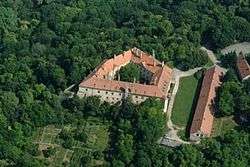Hlohovec
| Hlohovec | |||
| Town | |||
| Hlohovec, view from south | |||
|
|||
| Country | Slovakia | ||
|---|---|---|---|
| Region | Trnava | ||
| District | Hlohovec | ||
| Tourism region | Dolné Považie | ||
| River | Váh | ||
| Elevation | 156 m (512 ft) | ||
| Coordinates | 48°26′00″N 17°48′12″E / 48.43333°N 17.80333°ECoordinates: 48°26′00″N 17°48′12″E / 48.43333°N 17.80333°E | ||
| Area | 64.125 km2 (24.76 sq mi) | ||
| Population | 22,192 (2011-12-31) | ||
| Density | 346/km2 (896/sq mi) | ||
| First mentioned | 1113 | ||
| Mayor | Miroslav Kolár | ||
| Timezone | CET (UTC+1) | ||
| - summer (DST) | CEST (UTC+2) | ||
| Postal code | 920 01 | ||
| Area code | +421-33 | ||
| Car plate | HC | ||
  Location of Hlohovec in Slovakia | |||
  Location of Hlohovec in the Trnava Region | |||
| Wikimedia Commons: Hlohovec | |||
| Statistics: MOŠ/MIS | |||
| Website: www.hlohovec.sk | |||
Hlohovec (German: Freistadt(l) an der Waag, Hungarian Galgóc, is a town in southwestern Slovakia, with a population of 22,192.[1]
Name
The name comes from *Glogovec, the Old Slavic name for a place densely overgrown by hawthorn. The Hungarian form Galgóc was adopted before a phonological change g > h in Slovak language.[2]
History
The first written evidence of its existence is from 1113, when a town with the name Galgocz was mentioned in the so-called Second Zobor Document. In 1362 Hlohovec obtained town privileges. Ottoman troops captured city and annexed it to the sanjak of Uyvar as the Holok eyalet in 1663. Austrian troops retook it in 1685.
Landmarks

The dominant building is a Renaissance-Baroque castle built in 1720. The castle is built on the place of a pre-existing Slavic settlement and a medieval castle. In the castle area is the Empire theatre built in 1802, a riding school from the 18th century, and a Baroque garden pavilion.
In the middle of St. Michael Square stands the Gothic church of St. Michael with its highly decorated portal. Next to the church is the Chapel of Saint Anna from the 18th century. In the northern border of the central part of the town is the Franciscan church and monastery built in 1492. Part of the monastery premises nowadays occupies the Museum of National History and Geography.
The most visited and beautiful natural part of town is the castle park with its lake, French terraces, and rare wood-species, especially old sycamore trees.
Demographics
According to the 1910 census the town had 7749 inhabitants: 5645 Slovaks 1401 Hungarians and 667 Germans, 83.6% of the people were Roman Catholic, 13.7% Jewish and 2.1% Lutheran. According to the 2001 census, the town had 23,729 inhabitants. 97.85% of inhabitants were Slovaks, 0.72% Roma and 0.63% Czechs.[3] The religious make-up was 79.58% Roman Catholics, 14.85% people with no religious affiliation and 2.44% Lutherans.[3]
Famous people
- Heinrich Berté (1858-1924), composer of Dreimäderlhaus.
- Peter Burian (b. 1959), diplomat
- Ján Hollý (1785–1849), writer
International relations
Twin towns — Sister cities
Hlohovec is twinned with:
See also
References
- ↑ http://mesto.hlohovec.sk/download_file_f.php?id=236853 Population as to end of 2011 Retrieved 2012-01-16
- ↑ Martin Štefánik - Ján Lukačka et al. 2010, Lexikón stredovekých miest na Slovensku, Historický ústav SAV, Bratislava, pp. 164, ISBN 978-80-89396-11-5. http://forumhistoriae.sk/-/lexikon-stredovekych-miest-na-slovensku
- 1 2 "Municipal Statistics". Statistical Office of the Slovak republic. Archived from the original on 2007-11-16. Retrieved 2007-12-15.
Genealogical resources
The records for genealogical research are available at the state archive "Statny Archiv in Bratislava, Nitra, Slovakia"
- Roman Catholic church records (births/marriages/deaths): 1660_1901 (parish A)
- Lutheran church records (births/marriages/deaths): 1792-1928 (parish B)
External links
- - Official website
- - Hlohovecko.sk - Regional Information System
- - Historical photos of Hlohovec
- - Virtual Tour of Hlohovec
- Surnames of living people in Hlohovec

